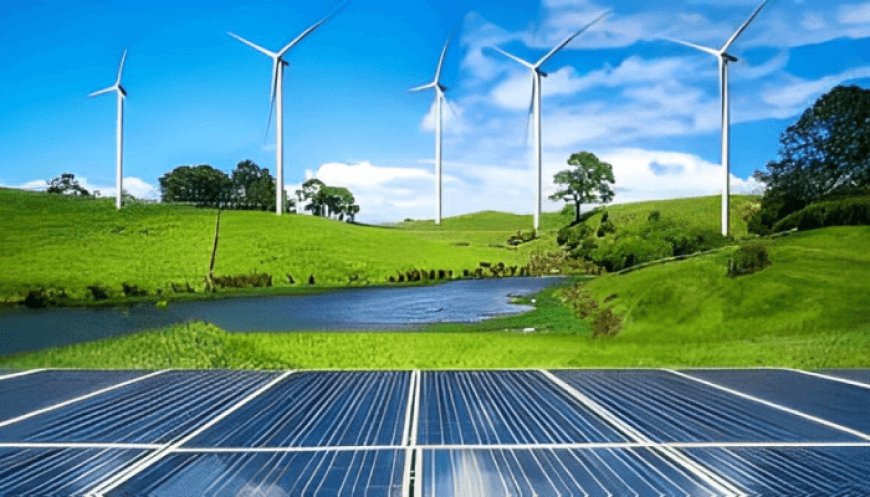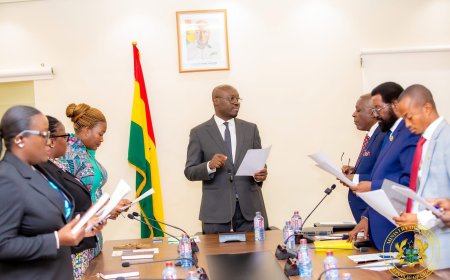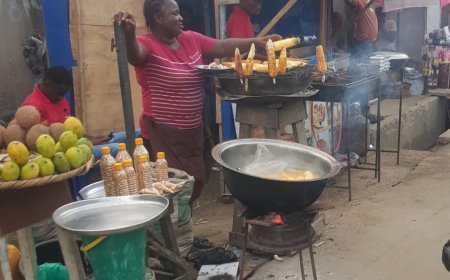Nigeria's Shift to Clean Energy : A Tough Sell?

As Nigeria grapples with the dual challenges of rising fuel costs and confront escalating air quality issues amidst economic challenges, the government has been pushing for a shift towards cleaner energy alternatives, particularly Compressed Natural Gas (CNG) and electric vehicles (EVs).

Drivers waiting to refill their CNG vehicles in a CNG refill station in Eyaen, Benin City, Edo State, Nigeria
These initiatives are part of broader efforts to reduce the countrys carbon footprint and dependence on imported petrol, which has become increasingly expensive. CNG, a by-product of coal mining or crude oil production, comprises mainly methane and serves as a cleaner and cost-effective alternative to conventional petrol and diesel fuels.
Since the Federal Government's decision to remove fuel subsidies from the pricing template of Premium Motor Spirit (PMS), commonly known as petrol, the cost of this essential commodity has skyrocketed from around N145 per liter to between N650 and N900 per liter.
This has caused widespread disruption, with many fuel stations across the country either closed or struggling to meet demand.
In cities, the situation is particularly dire, with long queues of frustrated customers waiting for hours to purchase fuel at the few stations that remain open.

Motorists queue and struggle to get petrol at a petrol station amidst high cost in Alapere Ketu, Lagos State, Nigeria
As the scarcity deepens, some people have turned to alternative sources, often referred to as the "black market," where petrol is sold at even higher prices, many of whom are now grappling with the high cost of fuel amid economic uncertainty.
In July 2024, the average retail price of petrol surged to N770.54 per liter, reflecting a 28.35% increase from the previous year according to Nigeria Bureau of Statistics (NBS) report.
This sharp rise in fuel costs has hit Nigerians hard, particularly those in the transport sector, where operating margins are slim, and any increase in fuel prices can significantly impact profitability.
Despite the government's efforts to promote CNG and EV adoption, there are significant hurdles. The cost of converting vehicles from petrol to CNG remains prohibitively high for many, with some drivers reporting expenses of up to N700,000 for conversion and installation of CNG cylinders.
The Presidential CNG Initiative (Pi-CNG)
The Presidential CNG Initiative (Pi-CNG) is a key component of President Bola Ahmed Tinubu's palliative efforts aimed at alleviating the hardships resulting from the Federal Government of Nigeria's removal of the fuel subsidy.

Map showing areas where the Conversion Incentive Program is available and not yet active
This initiative is designed to provide relief to the masses by promoting the adoption of Compressed Natural Gas (CNG) as a viable alternative to petrol, with ambitious plans to finance 200,000 new CNG buses and tricycles across Nigeria by 2027.
According to information available at the official website, the Pi-CNG highlighted that the Federal Government, through the initiative, is implementing a Commercial Vehicle Conversion Incentive Program (CV-CIP) which offers free conversion services (labour inclusive) for union registered vehicles in major cities across Nigeria where the conversion program has been activated.
Additionally, operators of ride-share vehicles are eligible for a 50% discount on the conversion costs.
As part of its CNG Funding Scheme, the Pi-CNG initiative aims to raise $25 million during its pilot phase, with a goal of securing $75 million by the end of 2024 and $250 million by 2027.
These funds are intended to support the development of CNG infrastructure across the country, significantly expanding the network of refueling stations and virtual gas distribution points.
Despite these lofty goals, data from the Pi-CNG initiative show that the initiative currently operates just 55 conversion centers across 11 states out of the 36 states and the Federal Capital Territory (FCT).
This limited reach underscores the challenges that lie ahead in scaling up the infrastructure needed to support widespread adoption of CNG, particularly in regions where access to conversion centers and refueling stations remains limited.
However, on-ground reports from drivers and conversion station operators suggest that these promised benefits have yet to be fully realized, with many drivers still bearing the financial burden of conversion.
Operators Speaks on Current Realities
"The government promised free conversions to encourage more drivers to switch to CNG, but we haven't seen this happening. Drivers are still paying out of pocket to convert their vehicles. The cost of conversion, which can be around N700,000 to N750,000, is a significant burden for many" says James Adeola, an operator at a CNG conversion station in Benin.
Adeola noted that the lack of free conversion services for private owners and non-union registered vehicles, is slowing down the adoption of CNG vehicles. "If the government followed through with their promise speedily and give it free for everybody, we would see a much faster transition. More drivers would be willing to switch if they don't have to bear the high initial costs. Right now, the financial burden is a major limiting factor."
James explains the financial pressures on CNG filling station operators. "We spend a lot of money to set up and maintain these stations. From the initial investment in equipment to ongoing maintenance and safety checks, it's not cheap. We simply can't afford to provide free services or subsidize conversions when we're already operating on tight margins."
James calls for more tangible support from the government. "If the government is serious about promoting CNG and reducing our carbon footprint, they need to step up. Providing actual free conversions or significant subsidies would make a huge difference. It would not only help drivers but also support the growth of the CNG infrastructure."
As an operator, James stresses the need to balance costs and services. "We want to support the transition to CNG because it's better for the environment and can save drivers money in the long run. But we also need to cover our expenses. Without adequate support, it's challenging to do both."
Petrol Prices and Economic Pressures
The economic pressures resulting from the removal of fuel subsidies are profound. The NBS recent data for July 2024, revealed substantial shifts in the average retail price of Premium Motor Spirit (PMS), commonly known as petrol.
The data indicates a significant year-on-year increase in prices, alongside notable regional disparities across the country.

Infographic of Petrol price watch across states and regions in Nigeria for the month of July 2024
The average retail price paid by consumers in July 2024 was N770.54, reflecting a significant 28.35% increase compared to the value recorded in July 2023, which stood at N600.35.
On a month-on-month basis, the average price also saw a rise of 2.72% from N750.17 in June 2024. This fluctuation reflects the complex dynamics of Nigerias fuel market, influenced by global oil prices, domestic supply chains, and government policies.
The price of petrol varied significantly across different states in Nigeria. Katsina State had the highest average retail price for petrol at N950.00. Following Katsina were Jigawa and Benue States, with prices recorded at N903.08 and N846.95, respectively. On the opposite end, Kwara, Edo, and Akwa Ibom States reported the lowest average retail prices, at N650.00, N669.75, and N673.75, respectively.
On a zonal basis, the North-West Zone had the highest average retail price at N820.10, while the South-South Zone recorded the lowest at N678.30.
This data highlights the regional disparities in fuel pricing across Nigeria, reflecting varying economic and logistical factors that influence the cost of petrol.
Transport Fare Trends
According to the latest data from NBS, the Transport Fare Watch for June 2024 reveals a complex picture of fare trends across different modes of transportation in Nigeria, with some categories experiencing declines while others show noticeable increases.
For average fare for bus journeys within cities, commuters paid an average of N963.58 per drop, a 1.28% decrease from the N976.08 recorded in May 2024. This decline is even more pronounced on a year-on-year basis, where the fare has decreased by 26.23% from N1,306.22 in June 2023.
For intercity travel, the average fare per drop in June 2024 was N7,029.23, representing a slight 0.52% decline from the N7,129.46 recorded in May 2024. However, on a year-on-year basis, the fare for intercity travel has surged by 24.72%, up from N5,686.49 in June 2023.
The average fare for Okada (Motorcycle) rides increased by 0.84% in June 2024, reaching N477.49, up from N473.51 in May 2024.
However, when compared to June 2023, the fare shows a significant decrease of 22.80%, down from N618.52. The dramatic rise in fuel prices has escalated transportation costs, exacerbating the financial strain on citizens already grappling with inflation.
Petrol Dependency and Public Acceptance of CNG
Imagbe Ebose, a taxi driver in Benin City, expressed his concerns about the practicality and safety of switching to CNG. "Ive been driving taxis for over 20 years, and Ive seen a lot of changes in the industry. CNG sounds like a good idea for reducing costs, but I'm worried about the safety of these conversions. I've heard stories about CNG cylinders causing accidents, and Im not willing to put my passengers or myself at risk. The government needs to ensure that these conversions are safe and reliable before asking us to switch."

Sample of a CNG cylinder installed in a vehicle in Benin City, Edo State, Nigeria
"As a driver, every naira counts. I've considered converting my car to CNG to save on fuel costs, but the upfront cost of conversion is just too high. Plus, there's the issue of maintenance. I'm not sure how much that would cost over time, and I can't afford any surprises. The government should offer some sort of financial assistance or subsidy if they really want us to make the switch," Miracle Agbonzie, a ride-hailing driver in Benin City highlighted.
Speaking with commercial driver Ibrahim Jide at NNPC filling station in Alapere, he highlighted the concerns of many in the transport sector. Switching to CNG or electric vehicles sounds great, but what about the cost of conversion and maintenance? We need more support and information from the government.
"I have heard about CNG and electric cars, but I dont know where to refuel or charge them, said Adekunle Babatunde, a commercial bus driver. Petrol is expensive, but its what we know. The government needs to do more to make these alternatives accessible.
Similarly, a motorist Ifeoma Richards shared her doubts. The idea of switching to CNG or an electric car sounds good, but Im worried about the cost and the availability of refueling stations. Right now, I cant afford to take that risk.
Chinedu Eze, a private car owner, shared his skepticism about the practicality of adopting new fuel technologies. "Switching to CNG or an electric vehicle is a good idea in theory, but the reality is different. I've been driving a petrol car for years, and it's what I'm used to. I know where to refuel, and I know the costs involved. With CNG or electric cars, there are too many unknowns, like where to find a refueling station, how much it will cost, and whether the car will even perform as well as my petrol car. Until there's more information and infrastructure, I'm not ready to make that leap."
Musa Adamu, a long-distance truck driver who frequently travels across multiple states in Nigeria, shared his perspective on the shift towards CNG. "I've been hearing a lot about CNG vehicles, but for someone like me who drives long distances, I have serious concerns. My biggest worry is the availability of CNG stations along the routes I travel. Petrol stations are everywhere, but where do I find CNG when I'm on the road in the middle of nowhere? It would be a huge risk for me to switch unless I know there's reliable infrastructure in place."
Motorists Speaks on CNG Usage Experience
Mr. Nosa Friday, a commercial taxi driver in Benin City has been driving a CNG vehicle for about a year now. He made the switch from a traditional fuel vehicle primarily to save on fuel costs and reduce his environmental impact.
Similarly, Chidi Okeke has been using a CNG vehicle for eight months. Like Mr. Friday, he was motivated by the promise of lower fuel costs and the desire to reduce his environmental footprint.
"Converting my car to CNG cost me around N750,000," Chidi says. "While this was a significant upfront expense, I did a lot of research and realized the long-term savings would make it worthwhile. Now, I spend just N200 per kilogram on refueling, which is much cheaper than petrol."
Switching to CNG involved significant initial costs. "It cost me about N700,000 to convert my car from petrol to CNG and to install the CNG cylinder," Nosa explains. "For refueling, it costs N200 per kilogram of CNG."
Despite the high initial conversion cost, the day-to-day fuel expenses are much lower. "Refueling with CNG is significantly cheaper than petrol or diesel, so I save a lot of money in the long run," Nosa notes.
Performance Reliability and Refueling Convenience
When it comes to performance and reliability, Nosa finds that his CNG vehicle performs similarly to his previous petrol vehicle. "I haven't noticed any major differences in how the car drives. Reliability has been good so far, and I haven't faced any serious issues."
Refueling at CNG stations is generally convenient for Nosa, although there are fewer CNG stations compared to petrol stations. "Sometimes I have to drive a bit further to find one, but the service is usually quick and efficient," he says.
Nosa sees room for improvement in the CNG infrastructure. "More CNG refueling stations would make it even more convenient. Also, it would help if the government provided some subsidies or incentives to lower the initial conversion costs for drivers."
Chidi finds the performance of his CNG vehicle to be quite satisfactory. "I was worried that switching to CNG might affect the power or speed of my car, but it runs just as well as it did on petrol. I've had no major mechanical issues so far, and the reliability has been impressive."

CNG refilling station in Eyaen, Benin City, Edo State, Nigeria
One of the challenges Chidi faces is the availability of refueling stations. "There aren't as many CNG stations as petrol stations, so sometimes I have to plan my routes to ensure I can refuel without too much hassle. But overall, the refueling process is quick and straightforward."
Chidi points out some areas for improvement. "We definitely need more CNG refueling stations to make it easier for drivers. Additionally, government subsidies or incentives for converting vehicles to CNG would encourage more drivers to make the switch."
According to them, there is just one CNG station around the city located at Eyaen, in Uhunmwonde local government area. Although the services of refilling is fast and reliable, users have to drive from distance to get to the station to refill.
Public Skepticism and Path Forward
Many Nigerians still prefer petrol-powered vehicles due to familiarity and the existing infrastructure supporting them. For many in the transport sector, the gap between government policy and reality continues to be a major obstacle.
To foster acceptance, the government must implement targeted public education campaigns to raise awareness about the benefits and safety of these alternative fuels, as well as make implementation of free conversion tangible.
As Nigeria embarks on the transformative journey towards sustainable transport solutions, the integration of CNG represents a crucial step in improving air quality and urban mobility.
While significant challenges remain, including infrastructure development and public acceptance, the governments proactive initiatives will signal a commitment to creating a greener, healthier urban environment.
By fostering collaboration between public and private sectors and continuously evaluating the impact of these strategies, Nigeria can set a benchmark for other African cities striving for sustainable urban mobility in the face of pressing environmental and economic challenges.
The success of these initiatives depends not only on government policies but also on public willingness to embrace change, ensuring a sustainable and healthier future for all.
Continuous monitoring of air quality is essential to assess the effectiveness of these initiatives. The Lagos State Environmental Protection Agency (LASEPA) highlights that vehicle emissions are a primary contributor to the citys poor air quality.
Ongoing evaluations will ensure that new policies lead to tangible improvements in urban air quality and public health outcomes.
Source : Lead News Online
Author : Collins Odigie Ojiehanor/Lead News Online's Special Report Contributor
The author is a Health and Environmental reporter based in Lagos, Nigeria.
























































